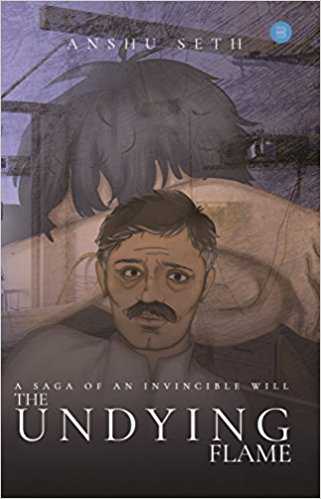
The Undying Flame: A Saga of an Invincible Will by Anshu Seth. Blue Rose Publishers. Pages 202. Rs 199
Rajdeep Bains
The debut novel by veteran journalist Anshu Seth chronicles one man’s fight against a system that threatens to pull him under at every step. As he takes on the mighty and the powerful of the land we are reminded of the adage from the Bible: “Beware the anger of a righteousness man, for his fury knows no bounds.”
Som Prakash, a farmer from Haryana, had thought his biggest achievement would be in ensuring his three children received an education that circumstances denied him. Little did he know that fate had a larger, tougher role for him. When his son is diagnosed with renal failure he has to quickly learn to deal with the world of hospitals and doctors.
A simple man, Som Prakash places his faith in doctors, urging them repeatedly to save his son. But when these men, who have sworn an oath to save lives, cheat and play with lives for monetary gain, the sense of betrayal is manifold. Instead of improving, his son Gulshan’s condition starts deteriorating and he is further diagnosed with HIV positive, contracted due to transfusion of untested blood during dialysis.
The novel talks about a father’s struggle as he decides to ensure the guilty are brought to book. It proves a formidable task for the uneducated Som Prakash, but he takes it on proving himself up to the task. The novel is a portrait of a system rotten to the core, and the human struggle of those risking their daily comforts and lives to uncover this.
Sometimes small acts of heroism become the harbinger of change. Som Prakash unwittingly becomes a symbol of hope. In his struggle, he touches many lives and discovers that if there is evil in this world, it is also full of good people. The many people who stood by him as he protested outside the hospital, the tea vendor who refused to charge him for his tea, the auto-rickshaw drivers who together decided not to charge him more than Rs 50 no matter where he went, the advocate who fought his case, the journalist who highlighted it…all these characters, based on real-life people, warm the heart.
A true story, the novel also touches on the stigma associated with disease and anyone who is seen as different. Gulshan’s friends abandon him and he is mercilessly teased in college. The few happy scenes with his family members are a stark contrast to the unhappiness and sense of injustice that pervades the entire novel.
The other passing reference in the novel, which perhaps needed greater elaboration, was about the lot of the informant. After bringing a system’s dark secrets to light, an informant’s life is never the same. Sister Sheenan risks her job to help Som Prakash uncover the truth, and pays for it with her life. Gulshan, the victim, is almost silenced by what seems an accident.
Though the novel ends on a hopeful note, a 10-year struggle culminating in an acceptance of sorts, it is difficult to sustain this hope when repeatedly we are shown a system that protects the corrupt. We can only hope as Som Prakash does, that this “dystopia will someday be replaced by utopia”.



























